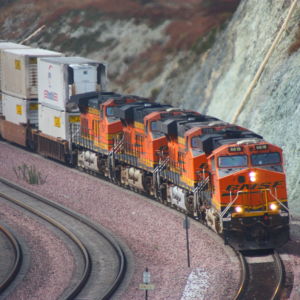The critical role small businesses and entrepreneurs play in the freight railroad industry is being threatened by regulations, according to a report this week.
The freight railroad industry is a uniquely important sector of the economy because many other industries rely on it to transport goods and raw materials. A problem in the freight railroad system could have a ripple effect throughout the economy. It also directly employs many workers while creating billions in economic activity.
The Small Business & Entrepreneurship Council (SBE Council) released the report to explore the role small businesses and entrepreneurs play in the freight railroad industry. The report also highlighted how deregulation nearly four decades ago helped save the industry from a downward spiral – and how efforts to add more regulations could undermine that.
“It also must be understood that the story of America’s freight railroads is a small business story,” SBE Council chief economist Raymond Keating said in a statement. “The U.S. economy very much is an entrepreneurial, small business economy, with smaller firms being the majority in most industries, and that is no different in the sectors directly and indirectly impacted by freight railroads.”
The SBE Council report looked at 13 key industries that are directly or indirectly affected by freight railroads. It found that in all but one that the majority of employer firms were small businesses with fewer than 20 employees. The warehousing and storage industry, for example, is 51.2 percent small businesses while agricultural is at 93.2 percent.
The report also found that the percentage of firms with fewer than 500 workers ranged from 83.3 percent in warehousing and storage to 99.8 percent in construction. This means there aren’t many firms in those industries with more than 500 employees and many with less than 20 employees.
The report also argues that the industry was saved because of a massive deregulatory effort in the 1980s. Supporters have argued that railroad companies could more easily make decisions based on market conditions – which helped lead to improved industry efficiency and productivity, capital investment, maintenance and safety, and profitability.
“As the American economy grows, the demand for freight transportation, including via rail, will increase,” the report stated. “In turn, it is important that the best policy environment be established to incentivize the entrepreneurship, investment and innovation that drive growth across the economy, including when it comes to transportation and railroads.”
Keating argues that efforts to reregulate the industry would be disastrous for many small businesses, the industry as a whole, and the economy. He pointed to the “forced access” proposal which would require private railroads to open their tracks to competitors.
“If imposed, such measures would be surefire ways of undermining profitability, investment and service,” Keating said. “Specifically, such government controls would diminish the ability and incentive to invest in rail capacity, maintenance and innovation; generate additional costs; and strike blows against reliability, speed, efficiency and safety.”
The Association of American Railroads (AAR) has also been vocally opposed to what it sees as overregulation in the railway industry. AAR research has found that the freight railroad industry has spent over $630 billion since the industry was partially deregulated in the 1980s. The trade group has also found that freight railroads created nearly $274 billion in economic activity, generated nearly $33 billion in state and federal tax revenues, and supported nearly 1.5 million jobs nationally in 2014 alone.
SBE Council distributed the report to congressional members Wednesday.

